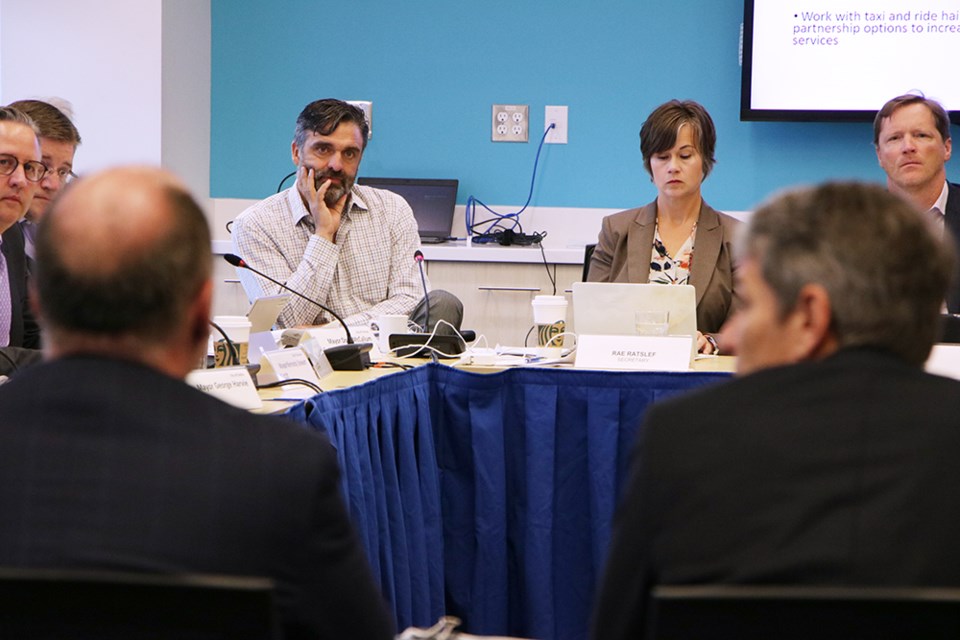A “shadow bus” system mimicking the SkyTrain service is being proposed to run a 24/7 rapid transit network in lieu of 24-hour trains.
That’s the result of a technical review of a proposal to run SkyTrain 24 hours on Fridays and Saturdays (dubbed “24/2”). The review found that proposal would leave TransLink at a net loss in terms of patrons served.
After running a test rescheduling all maintenance work to overnight Sunday to Thursday, leaving Friday and Saturday open, TransLink found significant portions of maintenance work could not be completed within those time constraints.
To make up for that lost time, TransLink would need to cut an hour of service off the end of every night from Sunday to Thursday, with the last trains leaving just after midnight instead of 1:15 a.m.
Altogether, for every seven people who would be served by the Friday/Saturday overnight service, 10 people would have lost out on the last hour of service from Sunday to Thursday.
Taking out that last hour of service for Sun-Thurs would reduce service for 1M people who use last hour SkyTrain. Only 700,000 would benefit from 24/2. #Translink
— dustin godfrey (@dustinrgodfrey) June 27, 2019
TransLink calls that a net loss, and instead proposed the shadow bus routes, which would run from when the trains stop at night to when they start again in the morning.
The proposal, pegged at roughly $4 million, comes with some major perks. For one, it wouldn’t need any extra capital investment, using buses that would otherwise be parked for the night.
It would also run 24/7 instead of 24/2, and that would be a benefit not only to those who may have been drinking downtown or elsewhere, but to those who work late at night – cooks, servers and health-care workers, for instance.
When the proposal made it to the mayors’ council Thursday morning, the idea in general was met with enthusiasm.
Vancouver Mayor Kennedy Stewart’s own amendment seeking urgent action was met with another amendment that would expand the service to the entire region, which formed the basis for much of the debate in the meeting.
Here’s a look at that proposed map: pic.twitter.com/MHeMwmp8zg
— dustin godfrey (@dustinrgodfrey) June 27, 2019
The North Shore only gets a small slice of the night bus express service, the New Westminster-Surrey line stops short of reaching Langley and the Burnaby-Coquitlam line does not reach the Ridge-Meadows area.
For members representing those areas, the proposal was yet another layer of service to already well-served corridors, neglecting communities that have not yet seen rapid transit projects like SkyTrain reaching their neighbourhoods.
“The characterization of this decision as somehow, if we vote in favour of the original motion, tomorrow we’re going to have the night SkyTrain bus service is completely wrong,” said Mayor Brad West of Port Coquitlam.
“For all the same reasons that Mayor [Doug] McCallum and Mayor Stewart say, we have to get on with things. And I agree, we have to get on with things for everyone. I would suggest that if they were in our shoes, they’d be taking the exact same position.”
Stewart, joined by members from Surrey, North Vancouver and other areas, opposed what he called a “hostile amendment,” and suggested that failing to act quickly on what’s currently proposed could mean losing out on the service altogether.
TransLink CEO Kevin Desmond agreed with the challenge to the second amendment, saying there was a reason the proposal was mapped out as it was.
“We know that the demand exists for that,” Desmond said. “We would go into this with the anticipation that it would be a valuable service, and it would have sufficient demand to justify the expenditure.”
Ultimately, the mayors’ council voted in favour of a referral that would see staff examine the night bus system as it is currently laid out and determine whether that is best rolled out into the current phase of service expansion or the next.
The referral would also have staff examine expanding that same system to the rest of the region, likely to be implemented in the next phase of service expansion.
–with files from Chris Campbell



